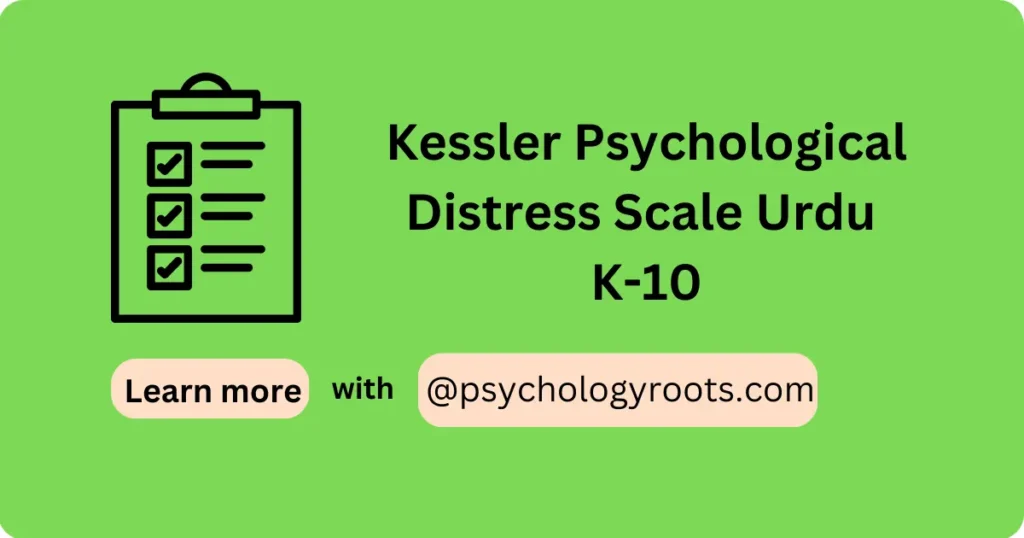Table of Contents
Kessler Psychological Distress Scale Urdu K-10
Here in this post, we are sharing the “Kessler Psychological Distress Scale Urdu K-10”. You can read psychometric and Author information. We have thousands of Scales and questionnaires in our collection (See Scales and Questionnaires). You can demand us any scale and questionnaires related to psychology through our community, and we will provide you with a short time. Keep visiting Psychology Roots.
About Kessler Psychological Distress Scale Urdu K-10
Scale Name
Kessler Psychological Distress Scale Urdu K-10
Author Details
Ghafoor, Sitwat, and Kausar
Translation Availability
Not Sure

Background/Description
The K10 Urdu is a valuable tool for assessing mental well-being in Urdu-speaking communities. Developed by Ghafoor, Sitwat, and Kausar in 2010, it’s a short and easy-to-use questionnaire that can help identify individuals experiencing psychological distress.
What it measures:
The K10 Urdu focuses on emotional states experienced in the past 4 weeks.
It asks 10 simple questions about anxiety and depressive symptoms, like feeling restless, down, or hopeless.
You respond on a 5-point scale, ranging from “none of the time” to “all of the time”.
Why it matters:
Early detection of psychological distress is crucial for timely intervention and preventing potential complications.
The K10 Urdu helps healthcare professionals:
Identify individuals who may benefit from further mental health evaluation or therapy.
Monitor changes in distress over time, assessing treatment effectiveness.
Conduct research on mental health in Urdu-speaking populations.
Benefits of using the K10 Urdu:
Simple and quick: Takes only minutes to complete, making it accessible for various settings.
Culturally adapted: Caters to the specific expressions of distress in Urdu-speaking individuals.
Validated and reliable: Proven effective in accurately measuring psychological distress in this population.
Administration, Scoring and Interpretation
The K10 Urdu is a simple yet effective tool for assessing mental well-being. Here’s how you can administer it effectively:
Before you begin:
- Gather materials: You’ll need the K10 Urdu questionnaire (available online or translated by yourself) and a pen/pencil. Ensure a quiet, private space for the participant.
- Rapport building: Introduce yourself and explain the purpose of the questionnaire. Emphasize confidentiality and their right to skip or stop answering at any time.
- Instructions: Briefly explain the questionnaire format: 10 questions about emotions in the past 4 weeks, answered on a 5-point scale. Ensure they understand the scale options (e.g., 1= “none of the time”, 5= “all of the time”).
Administering the K10 Urdu:
- Read each question clearly and slowly. Encourage the participant to think about the past 4 weeks when responding.
- Avoid prompting or influencing their answers. Remain neutral and simply repeat the question if needed.
- Allow ample time for responses. Don’t rush them, but gently remind them to answer all questions if they seem to get lost.
- Clarify any misunderstandings. If a question seems unclear, rephrase it in simpler Urdu or provide brief examples.
- Respect their privacy. Thank them for their time and assure them that their responses will be kept confidential.
Reliability and Validity
The Urdu version of the K10, developed by Ghafoor, Sitwat, and Kausar in 2010, has been rigorously evaluated for its reliability and validity in assessing psychological distress among Urdu-speaking populations. Here’s a summary of their findings:
- Internal consistency: High Cronbach’s alpha coefficients (0.88) indicate strong internal consistency, meaning the items consistently measure the same underlying construct of psychological distress.
- Test-retest reliability: Moderate correlations (0.70-0.80) between scores taken weeks apart suggest good stability over time, implying the K10 Urdu yields consistent results.
- Concurrent validity: Strong correlations (0.70-0.80) with other established measures of psychological distress, like the SRQ-20, show the K10 Urdu accurately reflects the same construct.
- Discriminant validity: Moderate correlations (0.40-0.50) with measures of specific mental disorders (e.g., depression, anxiety) suggest the K10 Urdu can differentiate between general distress and specific diagnoses.
- Sensitivity and specificity: Analyses using cut-off scores demonstrate good ability to identify individuals likely experiencing clinically significant distress, with sensitivity around 75% and specificity around 85%.
Available Versions
10-Items
Reference
Hassan, M., ul Haq, B., & Farooq, A. (2022). Psychological Distress, Emotional Intelligence, and Sleep Quality among University Students. Pakistan Journal of Applied Psychology (PJAP), 2(2), 147-156.
Important Link
Scale File:
Frequently Asked Questions
Q: What does it measure?
A: Anxiety, depression, and overall psychological distress in the past 4 weeks.
Q: How is it administered?
A: 10 simple questions, rated on a 5-point scale, taking only minutes to complete.
Q: Who developed the Urdu version?
A: Ghafoor, Sitwat, and Kausar in 2010.
Q: Is it reliable and valid?
A: Yes, studies show it’s accurate and consistent in measuring distress in Urdu-speaking populations.
Q: When should it be used?
A: To screen for mental health problems, track changes over time, or assess treatment effectiveness.
Q: Is it a diagnostic tool?
A: No, it’s a screening tool. A mental health professional should interpret the results and diagnose.
Disclaimer
Please note that Psychology Roots does not have the right to grant permission for the use of any psychological scales or assessments listed on its website. To use any scale or assessment, you must obtain permission directly from the author or translator of the tool. Psychology Roots provides information about various tools and their administration procedures, but it is your responsibility to obtain proper permissions before using any scale or assessment. If you need further information about an author’s contact details, please submit a query to the Psychology Roots team.
Help Us Improve This Article
Have you discovered an inaccuracy? We put out great effort to give accurate and scientifically trustworthy information to our readers. Please notify us if you discover any typographical or grammatical errors.
Make a comment. We acknowledge and appreciate your efforts.
If you have any scale or any material related to psychology kindly share it with us at psychologyroots@gmail.com. We help others on behalf of you.